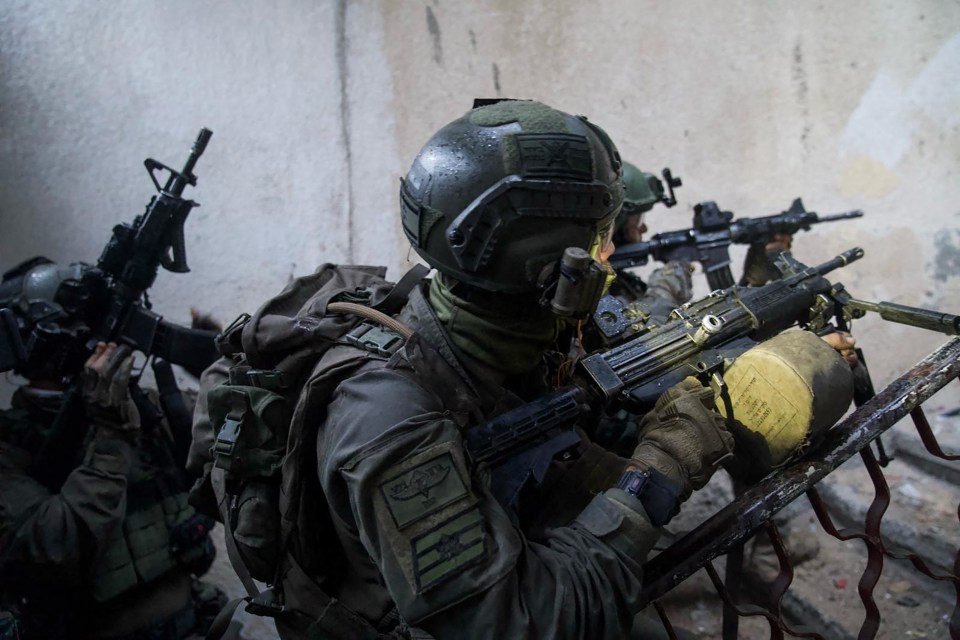ISRAEL is having to defend itself from seven different fronts as Iran’s puppets flex their muscles, a former British army colonel has warned.
It comes as the United States scrambles to prevent an all-out war in the Middle East after a deadly attack on Israeli territory by Lebanon-based militants Hezbollah killed 12 children.
Israel is set to respond as it prepares for conflict within Lebanon
Fears of an all-out conflict are again erupting after Hezbollah’s deadly strikes
A rocket hit a football pitch, killing children
In an exclusive interview with The Sun, Colonel Richard Kemp agreed Iran’s tentacles spread to as many as seven different theatres – an idea Israeli Prime Minister Benjamin Netanyahu recently sounded the alarm on.
The embattled nation remains in conflict with Hamas on the Gaza Strip as it fights to eradicate the terror group.
Another front is the West Bank, where militias including Hamas and others aim to expand influence.
Hezbollah in Lebanon was this week blamed for the deadly strike on a playing field in Israeli-occupied Golan Heights on the weekend, while Iran has also grown its influence in Syria.
Iraq and Yemen, with the Houthis causing havoc from the latter, make up the fifth and sixth fronts, and then there is Iran itself.
Colonel Kemp, who runs a charity linked with the Israeli Defence Force (IDF), suggested it wouldn’t be Israel’s intentions to ignite an all-out war.
But the spectre of an expanded conflict is looming, he warned, as Iran’s proxy powers like Hezbollah pop up with strikes on Israel.
He said: “Well, of course, this is a seven front war that Israel’s fighting on now.
“All of Israel’s opponents in each of those seven fronts are a manipulated, orchestrated arm, directed by Iran.
“And Iran has shown some scale, I suppose you call it, at coordinating actions and using one front to retaliate against actions on another front.”
Colonel Kemp added Iran would likely keep empowering its puppets rather than carrying out strikes itself, as it did in April when it fired hundreds of missiles and drones.
He said: “I think Iran learned quite a significant lesson from that, firstly, that it did not have the capability of severely damaging Israel in that way, because there was very little damage from hundreds of projectiles fired at Israel.
“Iran would be reluctant to initiate another, say, large scale attack from its own territory.
“It will use proxies around the region, I would expect, and that would include Hezbollah as well.”
Colonel Kemp expects Israel to respond to Hezbollah’s weekend attack – in which 12 kids were killed – with a significant but targeted strike.
It would be intended to hamper Hezbollah operations rather than spark a broader conflict, he said.
Who are Hezbollah?
Hezbollah – or the Party of God – is a Shia Muslim movement which emerged during the early 1980s with financial backing from Iran.
The group is now considered an Iranian proxy army and the group is committed to destroying Israel.
In 2001, UK ministers banned its external security organisation and seven years later, the proscription was extended to Hezbollah’s military wing.
A listing in the official register of banned groups says Hezbollah is “committed to armed resistance to the state of Israel, and aims to seize all Palestinian territories and Jerusalem from Israel”.
It added: “Its military wing supports terrorism in Iraq and the Palestinian territories.”
Brit officials have accused the Iran organisation of destabilising the Middle East and it is a proscribed group in the UK.
Any members in the UK or supporters could be jailed for up to 10 years.
But he added it remains a possibility and Reuters has reported the US is now racing to prevent any retaliatory strikes on Lebanon capital Beirut or key pieces of infrastructure like airports.
White House spokesperson John Kirby indicated the US backs Israel’s right to respond but walks a fine line to prevent broader war.
Colonel Kemp called on the US and UK to step up its support of Israel and ignore domestic political pressure, which has included mass protests and drama at university campuses amid the “free Palestine” movement.
He said: “We’ve got this power, the axis – Iran, China, and Russia threatening us, and we are really holding back, out of, I think, domestic political concerns.”
US Defence Secretary Lloyd Austin on Tuesday told Reuters he would prefer Middle Eastern rivals to solve their differences with diplomacy rather than rockets.
He said: “While we’ve seen a lot of activity on Israel’s northern border, we remain concerned about the potential of this escalating into a full-blown fight. And I don’t believe that a fight is inevitable.
“We’d like to see things resolved in a diplomatic fashion.”
Downing Street says escalation ‘extremely concerning’
An escalation in fighting between Israel and Lebanese militant group Hezbollah is “extremely concerning”, Downing Street has said.
The Prime Minister’s official spokesman told reporters: “We are deeply concerned about the situation and the risk of further escalation and destabilisation.”
I think as the PM has said before, the situation on the northern border of Israel is extremely concerning, and we’re calling on all parties to de-escalate.”
We urge both the Israeli and Lebanese governments to engage with the US-led discussions to reach a political settlement and resolve these tensions diplomatically.”
The official said he did not have an update and would not get into military movements when asked about a report that British navy ships on their way to the region may help a potential evacuation operation from Lebanon.
Israeli soldiers are facing threats from seven different angles, it’s warned
The US wants Israel to resolve its issues through diplomacy rather than rockets
Iran is unlikely to send its own missiles and instead empower its proxies, Colonel Kemp says
Hezbollah’s Golan Heights strikes inflicted immense suffering for family members of dead loved ones

